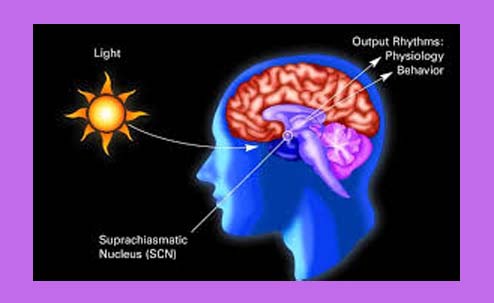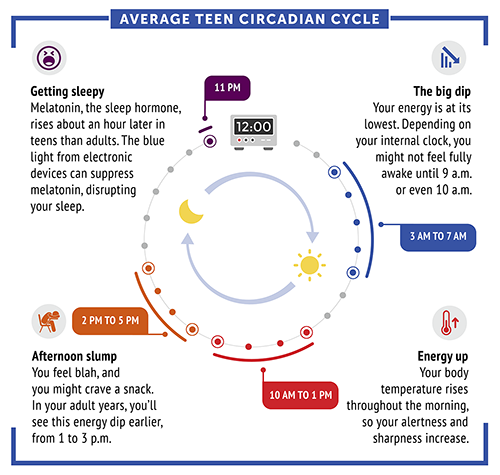The circadian rhythm controls two hormones which either make you extremely sleepy or wake you up at night. These are known as cortisol and melatonin. When you have a regular cycle, the brain’s natural clock or the circadian rhythm, slowly releases these hormones to inform the body about the time it is day or night. People whose sleep patterns are thrown out of sync, usually wake up much earlier than the others around them. It may take half an hour or more for the normal circadian rhythm to be set again. The result is that people who have irregular sleep cycles, don’t know when the clock is reset and thus experience jet lag.

Circadian rhythms are also found in the pineal gland and the brain. The pineal gland produces melatonin, a hormone, and the brain has control of the other two, especially the suprachiasmatic nucleus which controls the flaccid cells of the circadian clock. Fluctuating melatonin levels give rise to a variety of other problems including mood swings, impaired memory, and increased risk of depression. In January, researchers at the University of Rochester Medical Center in New York found that a decline in melatonin levels was associated with an increased risk of heart attacks.
Reduced melatonin level in the human brain can affect the timing of internal organs and controlling our sleep propensity. The hormone melatonin controls both the flaccid and the hibernatic modes of sleep. In the latter mode, the melatonin production is stimulated by the suprachiasmatic nucleus and inhibits the production of cortisol, the stress hormone. The study suggested that a decline in melatonin level may lead to complications in a person’s sleep disorder such as insomnia, sleep deprivation, and dysthymia.
Researchers studied four groups of individuals – three who had severe insomnia, one with mild insomnia and one with normal sleep-wake patterns. They measured the effects of melatonin on cortisol and sleep latency, using a sleep diary. The results showed that melatonin significantly affected both the latency and the duration of the falling light/no light syndrome. They further showed that melatonin suppressed the accumbens and the prefrontal cortex (the brain’s logical and emotional center) and the hippocampus, the part of the brain that coordinates behavior. These observations suggest that melatonin has a critical role in the regulation of cortisol and in the functioning of the hypothalamus and the suprachiasmatic nucleus.
According to the researchers, there are several mechanisms through which melatonin modulates cortisol level. The first mechanism is through the establishment of a master clock. They found that people whose circadian rhythm was disrupted, showed a reduction in the ability to circadian rhythm-regulate cortisol. The circadian rhythm was restored when they were put on an artificial day/night light cycle.
The second mechanism is through the decline of core body temperature. People whose circadian rhythms were disrupted slept less and felt hot more often. The same phenomenon was observed in people whose circadian rhythms were reset by going on a light/no light regimen. It is not clear why the resetting of circadian rhythms caused such profound changes in behavior. However, the study is in a way of testosterone, because resetting the circadian clocks restores homeostasis and homeostatic mechanisms.
Thirdly, the study looked at the effect of melatonin on biological clocks. All biological clocks in the body, including the bacterial circadian rhythm resellers in the GI tract, reset their clocks at the same time each day. By studying the effect of melatonin on these clocks, the researchers were able to demonstrate that it can indeed regulate the timing of these clocks. Melatonin acts as an external clock that inverts the homeostatic rhythm of the genes. As we know, genes determine the activity of cells through the genetic instructions, so by regulating the activity of these genes, the researchers have demonstrated that melatonin can indeed control the timing of biological clocks.
These results demonstrate how the circadian rhythm, which underlies the biological clock in our bodies, can be regulated. Whether it is the night or the day, humans need a good sleep in order to function properly. The findings of this research may thus suggest a way to promote better sleeping habits through environmental modification. This can be done by eliminating artificial light at night and by providing a good environment for the circadian rhythm to reset itself. Perhaps by putting a stop to the use of various gadgets that keep us from sleep, we will finally be able to have a good night’s sleep.

